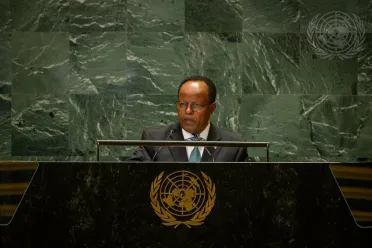Statement
Statement summary
TAYE ATSKE-SELASSIE AMDE, Minister for Foreign Affairs of Ethiopia, recalled a part of his country’s statement to the General Assembly in 1950 where it expressed its “anxiety concerning the surprises which the future may hold in store, fears that the United Nations may be called upon to face events even more serious than those of the present time and that such problems may greatly exceed its powers and capacity”. That future is now, he declared, warning that amidst existential threats from the arms race, extreme poverty, and inequality, “our constrained ability to manage the emerging multi-polar world carries the risk of undermining multilateralism”. Because challenges the UN faces are proving to exceed its powers and capacity, Ethiopia believes that collective security will be guaranteed when States are able to properly exercise their authority and safeguard their national security.
Noting that without being guided by the UN Charter, the General Assembly risks becoming a non-consequential platform with no guarantee for meaningfully contributing to global peace and security, he called for urgent Security Council reform, which would not be only about rectifying the injustice meted on Africa but also the Council’s credibility. Member States should therefore prioritize Africa’s representation in both membership categories of the 15-member organ, as “there is no shortcut or half solution to this longstanding quest for equality”. He stated that the African Union’s Agenda 2063 is being implemented in consonance with the 2030 Agenda, but the continent’s compounding debt crisis requires urgent intervention. Therefore, all actors in development finance should “work with us with a sense of solidarity and cooperation to navigate the challenges of reform and attain sustainable economic growth and development,” he urged.
The Cooperative Framework Agreement of the Nile River Basin will soon enter into force with the required number of ratifications, he announced, paving way for the sustained cooperation and mutual development across the entire river basin. Lamenting the insecurity across the Red Sea and Indian Ocean, manifested in conflicts, piracy and other illicit activities, he assured of efforts to collaborate with Ethiopia’s neighbours towards a peaceful navigation of the high seas. On terrorism in the Horn of Africa, he said: “I am confident that the Government of Somalia will recognize the sacrifices we made to Somalia’s liberation from the grip of terrorist groups.” He therefore rejected unfounded allegations against his country and called on the Somali Government to work with it to end terrorism in the region.
Full statement
Read the full statement, in PDF format.
Photo

Previous sessions
Access the statements from previous sessions.
